Debra L. Martin's Blog, page 319
December 3, 2011
Review: THE MOTHER DAUGHTER SHOW by Natalie Wexler
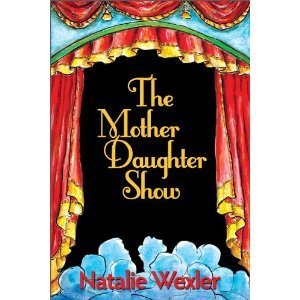
 4 of 5 stars
4 of 5 starsThe Mother Daughter Show is the story of three women and their daughters--the good one, the unresponsive one and the rebellious one--and their journey to a new and profound understanding for everyone. The exploration of their hopes and dreams reveals some unexpected and sometimes humorous results, but not before some serious issues are brought to light.
The daughters all attend the private and exclusive school, Barton's Friends School. It is a tradition for all the mothers of senior girls to put on a musical revue, one that they write, produce and all participate in. We are introduced to Amanda, the stay-at-home mom with her unresponsive daughter, Kate; Susan, the successful businesswoman and her too-good-to-be-true daughter, Allie; and Barb, the Parents Association volunteer and her out-right rebellious daughter, Grace. The author takes you on a wonderful journey full of well fleshed-out characters and real problems all told with some fun and witty dialogue. There are some serious issues that high school girls face and it is these problems that the Ms. Wexler brings some much-needed attention to.
As it turns out, the girls are not the only ones with attitudes. As Barb, the perennial people-pleaser, tries to corral all the mothers to work together on the show, tempers flair, egos are bruised and a number of walk-outs threaten to derail the show before it ever begins. Following the lives of the three moms and their issues as they deal with the pressure of their careers, their daughters and spouses will strike a chord of understanding for almost every woman who has tried to juggle her own needs and the responsibilities to everyone else in her life.
Whether married or single, a stay-at-home mom or career woman, the book explores the intricate and sometimes complicated issues and rewards women face with their female friendships. Add into the mix, the relationships these women have (or think they have) with their daughters and their own mothers, the Mother Daughter Show is a must read. Recommended.
Interview with Natalie Wexler (provided by Fuze Publishing LLC)
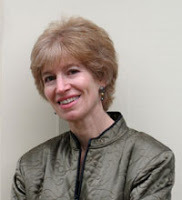 What inspired you to write the Mother Daughter Show?I wrote the "Mother Daughter Show" partly to try to maintain a sense of humor about a situation I found myself in—the real Mother Daughter Show, a longstanding tradition at Sidwell Friends School, where my daughter was a senior. It seems like almost every year peculiar things happen between the mothers. I wanted to understand why—what was it about this situation that made people act in ways they usually don't?
What inspired you to write the Mother Daughter Show?I wrote the "Mother Daughter Show" partly to try to maintain a sense of humor about a situation I found myself in—the real Mother Daughter Show, a longstanding tradition at Sidwell Friends School, where my daughter was a senior. It seems like almost every year peculiar things happen between the mothers. I wanted to understand why—what was it about this situation that made people act in ways they usually don't?I wanted to explore the stressful senior year, but I also saw the novel as an opportunity to write more broadly about the mother-daughter relationship. I gave each of my three main characters a mother of her own as well as a teenage daughter, to allow for a multi-generational aspect to the book.
What turned out to be your greatest challenge in writing the Mother Daughter Show?Coming up with a plot that worked. My first several drafts hewed much more closely to the show itself and several readers told me that I needed more dramatic action. I wanted to keep the show as the background that framed the story, though, so the challenge was to come up with another plot that I could somehow shoehorn into the one I had.
Your own children attended an elite private school in D.C. How much of your story was drawn from real life?In terms of details, not that much. … What I did borrow from real life about that situation is the excitement surrounding the presence of the First Family at the school, at least when they first got there. In the book, tickets to the annual school play sell at an unprecedented rate because think the President and First Lady might show up.
You're an accomplished writer—the award winning historical novel, "A More Obedient Wife" and now "The Mother Daughter Show. Can you speak to the differences to your approach to each project?The two novels are quite different and the creative process was different in many ways as well. To write a historical novel, you have to immerse yourself in the priod you're writing about. That requires lots of research. So it was a nice change not to have to grapple with that for "The Mother Daughter Show." Instead of burying myself in the library, I could just use my observations about the world around me.
Author bio:Natalie Wexler is the author of The Mother Daughter Show , to be published in December 2011, and an award-winning historical novel, A More Obedient Wife . She is a journalist and essayist whose work has appeared in the Washington Post Magazine, the American Scholar, the Gettysburg Review, and other publications, and she is a reviewer for the Washington Independent Review of Books. She has also worked as a temporary secretary, a newspaper reporter, a Supreme Court law clerk, a legal historian, and (briefly) an actual lawyer. She lives in Washington, D.C., with her husband.
Published on December 03, 2011 04:16
December 2, 2011
Sponsor: LEAH'S WAKE by Terri Guiliano Long

2011 BOOK BUNDLZ BOOK CLUB PICK Recipient of the Coffee Time Reviewers Recommend (CTRR) Award The Tyler family had the perfect life - until sixteen-year-old Leah decided she didn't want to be perfect anymore.
While her parents fight to save their daughter from destroying her brilliant future, Leah's younger sister, Justine, must cope with the damage her out-of-control sibling leaves in her wake.
What happens when love just isn't enough?
This mesmerizing debut novel tells the tale of a contemporary American family caught in the throes of adolescent rebellion - a heartbreaking, funny, ultimately redemptive quest for love, independence, connection and grace.
Buy links:Amazon Kindle: http://www.amazon.com/In-Leahs-Wake-ebook/dp/B0044XV7PG/ref=sr_1_3?ie=UTF8&qid=1306533515&sr=8-3
Barnes & Nobles Nook: http://search.barnesandnoble.com/In-Leahs-Wake/Terri-Giuliano-Long/e/2940011264566?itm=1&USRI=In%2BLeah27s%2BWake
Amazon UK:http://www.amazon.co.uk/gp/product/B0044XV7PG/ref=s9_simh_gw_p351_d0_i1?pf_rd_m=A3P5ROKL5A1OLE&pf_rd_s=center-2&pf_rd_r=0KPRJ2ETYF4CYY623Y5P&pf_rd_t=101&pf_rd_p=467128533&pf_rd_i=468294
Reviewer's Comments: http://www.tglong.com/blog/reviews/
Holly Robinson, contributing editor Ladies' Home Journal "In Leah's Wake is an irresistible read."
Susie Kline"As a mom, I felt what Zoe felt. It tore my heart out to see the promise of a child being being replaced with the nightmare of reality… I'm adding Terri Giuliano Long to my list of authors I want to be stranded with."
Monica Madsen"I give "In Leah's Wake" 5 stars and recommend reading to anyone with tweens. Although it is fiction, this book can be a great reference for parenting teenagers."
Interview Questions: Why did you decide to become an Indie author? In 2006, the book was under contract with an indie publisher. Shortly before the release, problems emerged. Soon after (unrelated to me), the company folded. I sent the book to a handful of agents, received lovely, complimentary responses, but no offers. I really believed in this book. I'd received so much encouragement over the years, from agents, editors, readers, writer friends—I'm grateful, truly grateful to all of them—that I had a hard time letting go. For years, I tried to revise. Eventually, I realized I was writing in circles. The book had changed, but it had gotten no better. Reluctantly, I put it away.
Last year, after several false starts, I finally gained traction on a new novel, my psychological thriller, Nowhere to Run. Like In Leah's Wake, Nowhere is a family story at heart. I knew I'd need a platform for this new book, and hoped that self-publishing In Leah's Wake would help me build one.
A lot of people self-publish today; for me, the indie route was a new, and scary, avenue. It's been bumpy ride – and the best thing I've ever done for myself.
Do you have an agent? Do you think they're vital to an author's success?That's a tough question. No, I don't currently have an agent. Indie authors don't need agents, of course. For writers who hope to publish with the big houses, an agent is an absolute necessity. A good agent will sell your book, shepherd you through the publishing process and help you think through your new projects. This is an invaluable service. A great agent is worth his or her fee in gold.
What was your first acceptance and is being accepted still a thrill?My short story, "You Belong to Me," published by Think magazine, was my first acceptance. Sure, acceptance is always a thrill. It means someone loves your work, which feels a lot like loving you. You feel that same initial energy you feel in a new relationship. As I've gotten older – I've been writing for 16 years – I've learned to take my career into my own hands. While I'm still excited by acceptance, I no longer need it to sustain me.
Have you had any rejections? If so, how do you deal with them?LOL – yes, sure. I don't know a writer who hasn't. I try to separate myself from my work. A short story or novel I've produced is my work; it's not me. Readers are subjective and taste idiosyncratic. The most successful – as well as the most artistic – work receives both good and bad reviews. You can't expect every reader to love your work. If you look at rejection from this perspective, it's a lot easier to accept.
What has been the toughest criticism you've received? The best compliment?I've had some scathing reviews, of late. While I'd love all 5-stars, that's unrealistic. Taste is largely individual, so I don't expect everyone to love the book. In Leah's Wake is relatively fast-paced for literary fiction, but it's neither a genre nor a plot-driven book. This in itself is a turnoff for some readers.
I've had wonderful reviews; the most moving was the blogger who said this: "Speaking to women who have read the book I have seen a lot of emotional and personal connection. It gave me a lot to think of both in my marriage and with raising my kids. Did you ever think that the book would make such an impact?"
Every writer hopes to connect with readers. I hoped people would recognize themselves or their friends, and that this might encourage a closer sense of community. I really believe, as Dostoevsky says, that we're all responsible to one another. But I wasn't at all sure how readers would feel or react. These words - hearing that my book has had an impact or touches people - move me deeply.
Do you have any upcoming projects in the works or other books that have been published?I'm currently working on a psychological thriller with a historical twist. Nowhere to Run takes place in the White Mountains in northern New Hampshire. A year after the brutal murder of her six-year-old daughter, Abby Minot, formerly an award-winning writer, accepts her first assignment—a profile of the philanthropic Chase family, kin of the popular New Hampshire senator and presidential hopeful, Matthias Chase.
In her initial research, Abby glimpses darkness under the Chase family's shiny veneer. Digging deeper, she uncovers a shocking web of lies and betrayal, dating back to the nineteenth century. Abby soon finds herself trapped—between an editor obsessed with uncovering the truth and the town and family who will stop at nothing to ensure it stays hidden.
Website: www.tglong.comBlog: www.tglong.com/blogTwitter: https://twitter.com/tglongFacebook: http://www.facebook.com/tglongwrites
Author bio:
 Terri Giuliano Long grew up in the company of stories both of her own making and as written by others. Books offer her a zest for life's highs and comfort in its lows. She's all-too-happy to share this love with others as a novelist and a writing teacher at Boston College. She was grateful and thrilled beyond words when her award-winning debut literary novel, In Leah's Wake, hit the Barnes and Noble and Amazon bestseller lists in August. She owes a lot of wonderful people – big time! – for any success she's enjoyed!
Terri Giuliano Long grew up in the company of stories both of her own making and as written by others. Books offer her a zest for life's highs and comfort in its lows. She's all-too-happy to share this love with others as a novelist and a writing teacher at Boston College. She was grateful and thrilled beyond words when her award-winning debut literary novel, In Leah's Wake, hit the Barnes and Noble and Amazon bestseller lists in August. She owes a lot of wonderful people – big time! – for any success she's enjoyed!
Published on December 02, 2011 05:00
December 1, 2011
Spotlight: WHEN HORSES HAD WINGS by Diana Estill

Book Blurb:
Pregnant at 16, Renee Goodchild drops out of school and marries. Now she's trapped in rural Texas with Kenny, her violent, garbage-collecting husband. A bleak future seems assured until she meets self-appointed relationship guru, Pearly.
"That's why you don't let 'em rule the roost. 'Cause you can't count on 'em to be there the next mornin' when it's time to crow," the worldly Pearly advises.
Renee narrates this tale of ruin and redemption where the damaged and downtrodden lead each other to unintended, sometimes heartbreaking, and often bittersweet outcomes. When Horses Had Wings examines the lives of broken people competing for the most basic needs: the primal urge for affection and the eternal search for acceptance.
When Horses Had Wings: Kindle/U.S., Kindle/U.K., B&N, Smashwords
Reviewers' Comments: "Ms. Estill is a true wordsmith and not only did I enjoy the actual story itself, it was a separate pleasure just to read the words."
"If you like Fannie Flagg, Billie Letts, Wally Lamb and Kaye Gibbons, give this new novelist a read." Author Bio:
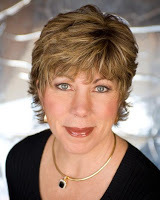 Diana Estill is the author of three humor books, one novel, and a collection of short stories. For Deedee Divine's Totally Skewed Guide to Life, she was named a ForeWord Book of the Year Finalist and an International Book Awards Winner in the humor category.
Diana Estill is the author of three humor books, one novel, and a collection of short stories. For Deedee Divine's Totally Skewed Guide to Life, she was named a ForeWord Book of the Year Finalist and an International Book Awards Winner in the humor category. Prior to becoming an author, Diana worked for many years as a journalist and humor columnist. Her columns have appeared in The Dallas Morning News, Washington Post, The Miami Herald, Road & Travel, and other publications. She has been featured in First Magazine and has appeared on a variety of TV shows and radio programs.
Diana's debut novel, When Horses Had Wings, was inspired by her life experiences as a former teen mother and high school dropout. After completing her education, she taught GED classes, worked as a consultant to the National Institute for Literacy and American Council on Education, and served as a U.S. delegate to a UNESCO conference.
Website: www.TotallySkewed.com
Published on December 01, 2011 05:00
November 30, 2011
Spotlight: MY PLANET, OR YOURS? by LC Evans

Book BlurbNora Bryant is a single Earth woman out to ban men from her life after a recent breakup. Triskam is a strikingly handsome extraterrestrial, who crash lands near her remote Arizona home. Add to this mix, a couple of misguided thugs looking for a gold rush, an overly friendly, not-so-guard dog, and a communications device that thinks it's a nanny, and you have My Planet or Yours?, a delightful new romantic comedy by LC Evans, author of the Kindle bestseller, We Interrupt This Date.
Buy links:Amazon: http://www.amazon.com/My-Planet-or-Yours-ebook/dp/B0066QAR0K/ref=sr_1_1?s=digital-text&ie=UTF8&qid=1321556267&sr=1-1
B&N: http://www.barnesandnoble.com/w/my-planet-or-yours-lc-evans/1107216735?ean=2940013591974&itm=1&usri=my%252bplanet%252bor%252byours3f
Reviewers Comments:
"A truly quirky out-there and yet down-to-earth tale of romance with a special guy, a space-traveler from another planet who also happens to be a hunk... Add some bad guys and a loveable pup and you have another great read from LC Evans. Highly Recommended!" Barbara Silkstone
"Another whimsical romance from the deft imagination of L.C. Evans." Dana Taylor
"I discovered L.C.'s novels a while back and thoroughly enjoyed them. When I saw this new one - I knew I had to purchase it and wasn't disappointed. If you want a fast whimsical story to read - this fits the bill." N.A. Gauthier
Author Bio:
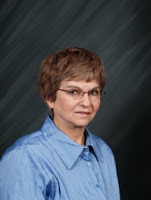 L.C. Evans began her writing career with short stories and essays before branching out into novel writing. More than a hundred of her stories and humorous essays have been published in such magazines as Alfred Hitchcock's Mystery Magazine, Woman's World, Horse Illustrated, and Ladies Circle among many others. Over the years Ms. Evans has won awards in writing contests and has kept busy honing her craft by taking writing courses and attending writing seminars. She was recently a featured presenter at the Carolinas Writers Conference in Wadesboro, North Carolina. After traditional publication of Talented Horsewoman, the first of her Leigh McRae horse mystery novels, Ms. Evans decided to take control of her career by trying her hand at indie publishing.
L.C. Evans began her writing career with short stories and essays before branching out into novel writing. More than a hundred of her stories and humorous essays have been published in such magazines as Alfred Hitchcock's Mystery Magazine, Woman's World, Horse Illustrated, and Ladies Circle among many others. Over the years Ms. Evans has won awards in writing contests and has kept busy honing her craft by taking writing courses and attending writing seminars. She was recently a featured presenter at the Carolinas Writers Conference in Wadesboro, North Carolina. After traditional publication of Talented Horsewoman, the first of her Leigh McRae horse mystery novels, Ms. Evans decided to take control of her career by trying her hand at indie publishing. "All this means," she says, "is that I pay for my own editing, proofreading, cover design, formatting, and all the other publishing expenses. However, I also get complete control over my books, and that means I can keep the price low. Readers on a budget will still have access to my books. I care deeply about all of my readers and I take great joy in the many fan letters readers send me."
Please contact her at: lcevans@lcevans.com
Published on November 30, 2011 05:00
November 29, 2011
25 Famous Authors with Disabilities
Learning disabilities, including dyslexia, ADD, ADHD, and autism can be life changing and debilitating. Many students struggle in school or drop out altogether. But for others, a learning disability may be a gift, requiring them to work harder and achieve more, or have a special focus or talent. It is for this reason that so many high achieving people have learning disabilities, including Einstein, Benjamin Franklin, and Leonardo Da Vinci. Although those with learning disabilities typically have trouble with communication, many writers are also in the high achieving, learning disabled club. We've highlighted 25 of them here: famous authors and writers who suffer, or thrive from, a learning disability.
1. Agatha Christie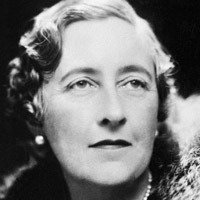 Agatha Christie is the best-selling author of all time, with about four billion copies sold and translations into at least 103 languages. She is best known for her detective novels and short story collections. But at the same time, she couldn't even balance her own checkbook due to her learning disability, believed to be dysgraphia. She had a hard time spelling correctly, as a self proclaimed "extraordinarily bad speller" and was not good about remembering numbers, but her learning disability did not hold her back.
Agatha Christie is the best-selling author of all time, with about four billion copies sold and translations into at least 103 languages. She is best known for her detective novels and short story collections. But at the same time, she couldn't even balance her own checkbook due to her learning disability, believed to be dysgraphia. She had a hard time spelling correctly, as a self proclaimed "extraordinarily bad speller" and was not good about remembering numbers, but her learning disability did not hold her back.
2. Stephen J. CannellStephen J. Cannell was an American writer and novelist, as well as TV producer and sometime actor. His most celebrated work was crime drama scripts, with writing credits including The A-Team, 21 Jump Street, The Rockford Files, and The Greatest American Hero. He suffered from dyslexia and struggled in school, but he graduated from the University of Oregon. Cannell used his fame to speak out about dyslexia, and discussed his experiences in the documentary Dislecksia: The Movie.3. F. Scott Fitzgerald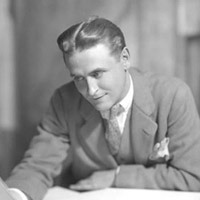 As one of the greatest American writers of the 20th century, F. Scott Fitzgerald is best known for his novel, The Great Gatsby, as well as many short stories. But F. Scott Fitzgerald is believed to have had a learning disability, mostly likely dyslexia. It's reported that he was kicked out of school at the age of 12 for not focusing or finishing his work, and he had a very hard time spelling, but he succeeded as a writer despite his disability.
As one of the greatest American writers of the 20th century, F. Scott Fitzgerald is best known for his novel, The Great Gatsby, as well as many short stories. But F. Scott Fitzgerald is believed to have had a learning disability, mostly likely dyslexia. It's reported that he was kicked out of school at the age of 12 for not focusing or finishing his work, and he had a very hard time spelling, but he succeeded as a writer despite his disability.
4. Scott AdamsThe man behind the comic strip Dilbert self-diagnosed his dyslexia. He was working as a bank teller and noticed that his totals didn't balance at the end of the day. But dyslexia does not seem to have hindered his success, as Dilbert is well loved, in addition to his books, restaurant ownership, and appearances on TV shows. Adams also suffers from focal dystonia, a condition that causes involuntary muscular contraction, as well as spasmodic dysphonia, but he is able to work around all of his conditions.5. JF LawtonJF Lawton is a prolific screenwriter, with screen credits including Pretty Woman, Under Siege, and DOA: Dead or Alive. But before he became a popular screenwriter, he suffered from severe dyslexia. The disability made school life difficult, and Lawton had to work hard to overcome this obstacle to become a writer. He credits his father, author Harry Lawton, with the support he needed to succeed– something that families of dyslexics should keep in mind.6. Dav PilkeyDav Pilkey, author and illustrator of the Captain Underpants book series, was diagnosed with ADHD and dyslexia at an early age. His disabilities caused him to act out in class, and he spent lots of time banished to a desk in the school hallway. It was at this desk where he created Captain Underpants, the character that made him famous as an author and illustrator of children's literature. For Dav Pilkey, dyslexia and ADHD helped launch a career.7. George Bernard ShawThe famous Irish playwright George Bernard Shaw wrote more than 60 plays and is the only person to be awarded an Oscar as well as a Nobel Prize for Literature for the same film, Pygmalion. It's believed that Shaw suffered from ADD (attention deficit disorder). Although he was a co-founder of the London School of Economics, he did not like formal education, noting that "Schools and schoolmasters, as we have them today, are not popular as places of education and teachers, but rather prisons and turnkeys in which children are kept to prevent them disturbing and chaperoning their parents."8. Jeanne Betancourt Award winning author Jeanne Betancourt is beloved for her Pony Pals book series. Two of the characters in her books, Brian in My Name is Brain Brian and Anna in the Pony Pals, are both dyslexic. She has publicly spoken out about her dyslexia, sharing that she believes being dyslexic helped her as a writer, and explaining that, "Since learning to read and write was difficult for me growing up, I paid more attention to the world around me. I watched and listened carefully to people for clues to what people were thinking and feeling." As a dyslexic, she better developed her skills as a storyteller.
Award winning author Jeanne Betancourt is beloved for her Pony Pals book series. Two of the characters in her books, Brian in My Name is Brain Brian and Anna in the Pony Pals, are both dyslexic. She has publicly spoken out about her dyslexia, sharing that she believes being dyslexic helped her as a writer, and explaining that, "Since learning to read and write was difficult for me growing up, I paid more attention to the world around me. I watched and listened carefully to people for clues to what people were thinking and feeling." As a dyslexic, she better developed her skills as a storyteller.
9. Richard FordRichard Ford is a Pulitzer Prize-winning American author and a dyslexic. He's famous for The Sportswriter and its sequels, as well as his short story collection Rock Springs. He has mild dyslexia, but he did not let his disability keep him from developing a love of literature. In fact, he believes that dyslexia actually helped him become a better reader as the disability made him slow down and be thoughtful about the books, sharing that "being slow made me pore over sentences and to be receptive to those qualities in sentences that were not just the cognitive aspect of sentences but were in fact the "poetical" aspects of language…those qualities in language are as likely to carry weight and hold meaning and give pleasure as the purely cognitive, though of course we can't fundamentally separate those things, although the information age does its best."10. Jules VerneJules Verne pioneered the science fiction genre and inspired steampunk. He is most famous for his novels, including A Journey to the Center of the Earth, Twenty Thousand Leagues Under the Sea, and Around the World in Eighty Days. As a student, he was more interested in writing than working in other subjects. He didn't do well in school, and often complained of having a hard time focusing. Although undiagnosed, it's believed that Verne may have had a form of ADD or ADHD.11. WB Yeats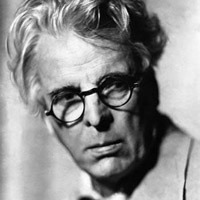 One of the most important figures in 20th century literature, this Irish poet and playwright suffered from an undiagnosed learning disorder. He recalls: "Several of my uncles and aunts had tried to teach me to read, and because they could not, and because I was much older than children who read easily, had come to think, as I have learnt since, that I had not all my faculties." Yeats' father attempted to teach him as well, but without much success: ""My father was an angry and impatient teacher and flung the reading book at my head." He did eventually learn to read, and attended the Metropolitan School of Art (now known as the National College of Art and Design) in Dublin. He remained poor in spelling for the rest of his life, but Yeats achieved greatness beyond excellent spelling as he was awarded the Nobel Prize in Literature in 1923.12. Patricia PolaccoChildren's author and illustrator Patricia Barber Polacco is a prolific writer, although she didn't start her first book until the age of 41. She didn't do well in school, and wasn't able to read until the age of 14. Patricia suffered from undiagnosed dyslexia until a teacher recognized her disability. She recognized this great teacher in the book Thank You, Mr. Falker, which shares the story of what happened when he discovered her dyslexia.13. Fannie FlaggAlthough Fannie is an actress and comedienne, she is best known as the author of Fried Green Tomatoes at the Whistle Stop Cafe, which was made into a movie and earned her an Academy Award nomination for screenplay adaptation. She is a talented writer, but she felt her dyslexia challenged this talent. She felt discouraged and embarrassed because she couldn't (and still can't) spell. She put her writing career on hold for many years, working as an actress instead, but returned to writing in the 1980s, much to the celebration of Fried Green Tomatoes fans.14. John IrvingAcademy Award-winning screenwriter and novelist John Irving is a popular author, with bestsellers including The World According to Garp and The Cider House Rules. But John Irving's dyslexia made him somewhat of an underdog, although as his high school wrestling coach said, "An underdog is in a position to take a healthy bite." Which is exactly what Irving did. He gave himself more time to work on assignments, kept a list of frequently misspelled words, and rewrote constantly in school. He was able to work through his disability to become the celebrated writer we know today.15. Victor Villasenor
One of the most important figures in 20th century literature, this Irish poet and playwright suffered from an undiagnosed learning disorder. He recalls: "Several of my uncles and aunts had tried to teach me to read, and because they could not, and because I was much older than children who read easily, had come to think, as I have learnt since, that I had not all my faculties." Yeats' father attempted to teach him as well, but without much success: ""My father was an angry and impatient teacher and flung the reading book at my head." He did eventually learn to read, and attended the Metropolitan School of Art (now known as the National College of Art and Design) in Dublin. He remained poor in spelling for the rest of his life, but Yeats achieved greatness beyond excellent spelling as he was awarded the Nobel Prize in Literature in 1923.12. Patricia PolaccoChildren's author and illustrator Patricia Barber Polacco is a prolific writer, although she didn't start her first book until the age of 41. She didn't do well in school, and wasn't able to read until the age of 14. Patricia suffered from undiagnosed dyslexia until a teacher recognized her disability. She recognized this great teacher in the book Thank You, Mr. Falker, which shares the story of what happened when he discovered her dyslexia.13. Fannie FlaggAlthough Fannie is an actress and comedienne, she is best known as the author of Fried Green Tomatoes at the Whistle Stop Cafe, which was made into a movie and earned her an Academy Award nomination for screenplay adaptation. She is a talented writer, but she felt her dyslexia challenged this talent. She felt discouraged and embarrassed because she couldn't (and still can't) spell. She put her writing career on hold for many years, working as an actress instead, but returned to writing in the 1980s, much to the celebration of Fried Green Tomatoes fans.14. John IrvingAcademy Award-winning screenwriter and novelist John Irving is a popular author, with bestsellers including The World According to Garp and The Cider House Rules. But John Irving's dyslexia made him somewhat of an underdog, although as his high school wrestling coach said, "An underdog is in a position to take a healthy bite." Which is exactly what Irving did. He gave himself more time to work on assignments, kept a list of frequently misspelled words, and rewrote constantly in school. He was able to work through his disability to become the celebrated writer we know today.15. Victor Villasenor
 Acclaimed Mexican-American writer Victor Villasenor is famous for Rain of Gold, a New York Times bestselling novel. He has spoken out about his dyslexia extensively, including his experience with the disability in Burro Genius: A Memoir. In this book, he describes dyslexia as a gift that allowed him to see things differently, relating that dyslexia "allowed me to see patterns that other people couldn't see. In high school, it was very difficult at first for me to learn how to play chess, but then once I learned, I quickly became the best chess player at our whole school, even beating our faculty and some of them thought they were great chess players." Victor Villasenor turned his disability into an advantage and went on to become a famous novelist.16. Lynda La PlanteLinda La Plante is famous for writing the TV crime series Prime Suspect, for which she won an Edgar Award from the Mystery Writers of America. She has worked on several TV series, as well as novels, but La Plante has not been without challenges. She had trouble writing, and was uncomfortable until she learned to use a typewriter. Even now, though, she is careful to never send anything out without first having it checked by an assistant.17. Octavia Estelle Butler
Acclaimed Mexican-American writer Victor Villasenor is famous for Rain of Gold, a New York Times bestselling novel. He has spoken out about his dyslexia extensively, including his experience with the disability in Burro Genius: A Memoir. In this book, he describes dyslexia as a gift that allowed him to see things differently, relating that dyslexia "allowed me to see patterns that other people couldn't see. In high school, it was very difficult at first for me to learn how to play chess, but then once I learned, I quickly became the best chess player at our whole school, even beating our faculty and some of them thought they were great chess players." Victor Villasenor turned his disability into an advantage and went on to become a famous novelist.16. Lynda La PlanteLinda La Plante is famous for writing the TV crime series Prime Suspect, for which she won an Edgar Award from the Mystery Writers of America. She has worked on several TV series, as well as novels, but La Plante has not been without challenges. She had trouble writing, and was uncomfortable until she learned to use a typewriter. Even now, though, she is careful to never send anything out without first having it checked by an assistant.17. Octavia Estelle Butler
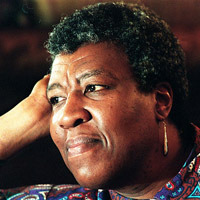 Octavia Estelle Butler was one of the few African-American women in the field of American science fiction, but she was also one of the best, as the first science fiction writer to receive the MacArthur Foundation Genius Grant in 1995. But Octavia, often known as Junie, was diagnosed as a dyslexic. She also loved to daydream and was very shy. She dealt with her shyness by working past her dyslexia and losing herself in books, as well as writing her own stories as early as 10. She developed an interest in science fiction at age 12, sparking a lifelong talent as a science fiction writer.
Octavia Estelle Butler was one of the few African-American women in the field of American science fiction, but she was also one of the best, as the first science fiction writer to receive the MacArthur Foundation Genius Grant in 1995. But Octavia, often known as Junie, was diagnosed as a dyslexic. She also loved to daydream and was very shy. She dealt with her shyness by working past her dyslexia and losing herself in books, as well as writing her own stories as early as 10. She developed an interest in science fiction at age 12, sparking a lifelong talent as a science fiction writer.
18. Sherrilyn KenyonBestselling American author Sherrilyn Kenyon is best known for her Dark-Hunter vampire series. She has gathered an international following, with bestsellers frequenting New York Times, USA Today, and Publishers Weekly lists. She relates that dyslexia has impacted her writing, sharing, "The first book I wrote, most of the letters were backwards and much of it is horribly misspelled, but it didn't stop me." Kenyon persevered and followed her dreams to become a bestselling author, but minces no words explaining that "the dyslexia is a bummer, as my copy-editors will tell you."19. Eileen SimpsonEileen Simpson was a noted memoirist, sharing insight into her husband John Berryman and the poets that came into their lives. Although she was expected more to be a writer's wife than a writer herself, she nonetheless became a celebrated author. In addition to social expectations, Simpson overcame acute dyslexia to become a writer, a condition that was diagnosed by Berryman, but had impacted her in school years earlier as she only pretended to read and write. She clearly overcame her disability, becoming the critical acclaimed writer we know today.20. Don Mullan Don Mullan is a bestselling Irish author, best known for his book Eyewitness Bloody Sunday, which sparked a new Bloody Sunday Inquiry. He was an eyewitness to the events of Bloody Sunday in Derry at the age of 15. His book inspired the award winning film Bloody Sunday, for which he was a co-producer, source writer, and actor. He is very open about his dyslexia and outspoken about the condition. He's written and edited several books and documentaries on dyslexia, is a member of the International Dyslexia Association, and was a former keynote speaker at the International Symposium on dyslexia in Dublin.
Don Mullan is a bestselling Irish author, best known for his book Eyewitness Bloody Sunday, which sparked a new Bloody Sunday Inquiry. He was an eyewitness to the events of Bloody Sunday in Derry at the age of 15. His book inspired the award winning film Bloody Sunday, for which he was a co-producer, source writer, and actor. He is very open about his dyslexia and outspoken about the condition. He's written and edited several books and documentaries on dyslexia, is a member of the International Dyslexia Association, and was a former keynote speaker at the International Symposium on dyslexia in Dublin.
21. Bernard TaylorBernard Taylor is a celebrated British author and playwright. His work includes horror, true crime nonfiction, suspense, and romantic fiction, as well as theater plays, radio, and TV. He has won the Crime Writer's Association's Gold Dagger for Non-Fiction Award for Perfect Murder, and his novels The Godsend and Mother's Boys have both been made into film adaptations. He discovered his dyslexia at midlife, living 38 years undiagnosed. Taylor seems to be largely unruffled by the disability, but he does note that it sometimes slows him down, sharing that "it takes me dozens of rewrites to get it grammatically correct. But the creative juices keep me going. I am a big out of the box thinker."22. AviAvi is beloved for his middle grade reader historical fiction novels. With a half-century writing career, 50 books, two Newbery Honors, and a Newbery Medal, he has had a major impact on the world of fiction. But Avi's writing hasn't always been easy to deal with: his teachers complained of messy and careless writing. His sloppy work was due to dyslexia, and Avi had to take on special tutoring sessions after failing out of his first high school. It was during these tutoring sessions that Avi was inspired to become a writer, and he developed a love of reading and writing voraciously.23. Caiseal Mór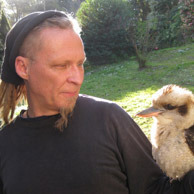 Bestselling Irish fantasy novelist Caiseal Mór is known for his The Wanderers series and The Watcher's trilogy. He's created several music and spoken word CDs, and he is also famous for his autobiography, A Blessing and a Curse, which discusses his life on the autism spectrum. Before his autobiography was released, he kept his disability a secret from the public. He was diagnosed as a child, not speaking until he was four, and was taught to be ashamed of his autism, worried that he'd end up in a mental hospital if people knew. Caiseal still struggles with conversation as an adult, and he much prefers the written word, making his career as a novelist a good fit for him.24. Gustave FlaubertGustave Flaubert is a French writer considered to be one of the greatest Western novelists. His first published novel, Madame Bovary, is the basis of his fame. He was known for his perfectionist style, and spoke out about his dyslexia, explaining, "I have the handicap of being born with a special language to which I alone have the key." Although he struggled with the written word throughout his life, he was able to accomplish greatness as a writer.25. John Elder RobisonJohn Elder Robison is best known for his memoir, Look Me in the Eye, which shares his life experiences as a sufferer of Asperger's syndrome. He's also the older brother of Augusten Burroughs, author of Running with Scissors. Robison was unaware of his condition until he was 39 years old, but has nonetheless become an active participant in the autism community. He serves as a volunteer spokesman for the Graduate Autism Program and as a public reviewer for autism research with the National Institute of Mental Health. In addition to his memoir, Robison has written Be Different, a guide for people with autism and Asperger's syndrome, explaining how to handle social situations.
Bestselling Irish fantasy novelist Caiseal Mór is known for his The Wanderers series and The Watcher's trilogy. He's created several music and spoken word CDs, and he is also famous for his autobiography, A Blessing and a Curse, which discusses his life on the autism spectrum. Before his autobiography was released, he kept his disability a secret from the public. He was diagnosed as a child, not speaking until he was four, and was taught to be ashamed of his autism, worried that he'd end up in a mental hospital if people knew. Caiseal still struggles with conversation as an adult, and he much prefers the written word, making his career as a novelist a good fit for him.24. Gustave FlaubertGustave Flaubert is a French writer considered to be one of the greatest Western novelists. His first published novel, Madame Bovary, is the basis of his fame. He was known for his perfectionist style, and spoke out about his dyslexia, explaining, "I have the handicap of being born with a special language to which I alone have the key." Although he struggled with the written word throughout his life, he was able to accomplish greatness as a writer.25. John Elder RobisonJohn Elder Robison is best known for his memoir, Look Me in the Eye, which shares his life experiences as a sufferer of Asperger's syndrome. He's also the older brother of Augusten Burroughs, author of Running with Scissors. Robison was unaware of his condition until he was 39 years old, but has nonetheless become an active participant in the autism community. He serves as a volunteer spokesman for the Graduate Autism Program and as a public reviewer for autism research with the National Institute of Mental Health. In addition to his memoir, Robison has written Be Different, a guide for people with autism and Asperger's syndrome, explaining how to handle social situations.
Reprinted with permission from: http://www.bachelorsdegreeonline.com/blog/2011/25-famous-authors-with-learning-disabilities/

1. Agatha Christie
 Agatha Christie is the best-selling author of all time, with about four billion copies sold and translations into at least 103 languages. She is best known for her detective novels and short story collections. But at the same time, she couldn't even balance her own checkbook due to her learning disability, believed to be dysgraphia. She had a hard time spelling correctly, as a self proclaimed "extraordinarily bad speller" and was not good about remembering numbers, but her learning disability did not hold her back.
Agatha Christie is the best-selling author of all time, with about four billion copies sold and translations into at least 103 languages. She is best known for her detective novels and short story collections. But at the same time, she couldn't even balance her own checkbook due to her learning disability, believed to be dysgraphia. She had a hard time spelling correctly, as a self proclaimed "extraordinarily bad speller" and was not good about remembering numbers, but her learning disability did not hold her back.2. Stephen J. CannellStephen J. Cannell was an American writer and novelist, as well as TV producer and sometime actor. His most celebrated work was crime drama scripts, with writing credits including The A-Team, 21 Jump Street, The Rockford Files, and The Greatest American Hero. He suffered from dyslexia and struggled in school, but he graduated from the University of Oregon. Cannell used his fame to speak out about dyslexia, and discussed his experiences in the documentary Dislecksia: The Movie.3. F. Scott Fitzgerald
 As one of the greatest American writers of the 20th century, F. Scott Fitzgerald is best known for his novel, The Great Gatsby, as well as many short stories. But F. Scott Fitzgerald is believed to have had a learning disability, mostly likely dyslexia. It's reported that he was kicked out of school at the age of 12 for not focusing or finishing his work, and he had a very hard time spelling, but he succeeded as a writer despite his disability.
As one of the greatest American writers of the 20th century, F. Scott Fitzgerald is best known for his novel, The Great Gatsby, as well as many short stories. But F. Scott Fitzgerald is believed to have had a learning disability, mostly likely dyslexia. It's reported that he was kicked out of school at the age of 12 for not focusing or finishing his work, and he had a very hard time spelling, but he succeeded as a writer despite his disability.4. Scott AdamsThe man behind the comic strip Dilbert self-diagnosed his dyslexia. He was working as a bank teller and noticed that his totals didn't balance at the end of the day. But dyslexia does not seem to have hindered his success, as Dilbert is well loved, in addition to his books, restaurant ownership, and appearances on TV shows. Adams also suffers from focal dystonia, a condition that causes involuntary muscular contraction, as well as spasmodic dysphonia, but he is able to work around all of his conditions.5. JF LawtonJF Lawton is a prolific screenwriter, with screen credits including Pretty Woman, Under Siege, and DOA: Dead or Alive. But before he became a popular screenwriter, he suffered from severe dyslexia. The disability made school life difficult, and Lawton had to work hard to overcome this obstacle to become a writer. He credits his father, author Harry Lawton, with the support he needed to succeed– something that families of dyslexics should keep in mind.6. Dav PilkeyDav Pilkey, author and illustrator of the Captain Underpants book series, was diagnosed with ADHD and dyslexia at an early age. His disabilities caused him to act out in class, and he spent lots of time banished to a desk in the school hallway. It was at this desk where he created Captain Underpants, the character that made him famous as an author and illustrator of children's literature. For Dav Pilkey, dyslexia and ADHD helped launch a career.7. George Bernard ShawThe famous Irish playwright George Bernard Shaw wrote more than 60 plays and is the only person to be awarded an Oscar as well as a Nobel Prize for Literature for the same film, Pygmalion. It's believed that Shaw suffered from ADD (attention deficit disorder). Although he was a co-founder of the London School of Economics, he did not like formal education, noting that "Schools and schoolmasters, as we have them today, are not popular as places of education and teachers, but rather prisons and turnkeys in which children are kept to prevent them disturbing and chaperoning their parents."8. Jeanne Betancourt
 Award winning author Jeanne Betancourt is beloved for her Pony Pals book series. Two of the characters in her books, Brian in My Name is Brain Brian and Anna in the Pony Pals, are both dyslexic. She has publicly spoken out about her dyslexia, sharing that she believes being dyslexic helped her as a writer, and explaining that, "Since learning to read and write was difficult for me growing up, I paid more attention to the world around me. I watched and listened carefully to people for clues to what people were thinking and feeling." As a dyslexic, she better developed her skills as a storyteller.
Award winning author Jeanne Betancourt is beloved for her Pony Pals book series. Two of the characters in her books, Brian in My Name is Brain Brian and Anna in the Pony Pals, are both dyslexic. She has publicly spoken out about her dyslexia, sharing that she believes being dyslexic helped her as a writer, and explaining that, "Since learning to read and write was difficult for me growing up, I paid more attention to the world around me. I watched and listened carefully to people for clues to what people were thinking and feeling." As a dyslexic, she better developed her skills as a storyteller.9. Richard FordRichard Ford is a Pulitzer Prize-winning American author and a dyslexic. He's famous for The Sportswriter and its sequels, as well as his short story collection Rock Springs. He has mild dyslexia, but he did not let his disability keep him from developing a love of literature. In fact, he believes that dyslexia actually helped him become a better reader as the disability made him slow down and be thoughtful about the books, sharing that "being slow made me pore over sentences and to be receptive to those qualities in sentences that were not just the cognitive aspect of sentences but were in fact the "poetical" aspects of language…those qualities in language are as likely to carry weight and hold meaning and give pleasure as the purely cognitive, though of course we can't fundamentally separate those things, although the information age does its best."10. Jules VerneJules Verne pioneered the science fiction genre and inspired steampunk. He is most famous for his novels, including A Journey to the Center of the Earth, Twenty Thousand Leagues Under the Sea, and Around the World in Eighty Days. As a student, he was more interested in writing than working in other subjects. He didn't do well in school, and often complained of having a hard time focusing. Although undiagnosed, it's believed that Verne may have had a form of ADD or ADHD.11. WB Yeats
 One of the most important figures in 20th century literature, this Irish poet and playwright suffered from an undiagnosed learning disorder. He recalls: "Several of my uncles and aunts had tried to teach me to read, and because they could not, and because I was much older than children who read easily, had come to think, as I have learnt since, that I had not all my faculties." Yeats' father attempted to teach him as well, but without much success: ""My father was an angry and impatient teacher and flung the reading book at my head." He did eventually learn to read, and attended the Metropolitan School of Art (now known as the National College of Art and Design) in Dublin. He remained poor in spelling for the rest of his life, but Yeats achieved greatness beyond excellent spelling as he was awarded the Nobel Prize in Literature in 1923.12. Patricia PolaccoChildren's author and illustrator Patricia Barber Polacco is a prolific writer, although she didn't start her first book until the age of 41. She didn't do well in school, and wasn't able to read until the age of 14. Patricia suffered from undiagnosed dyslexia until a teacher recognized her disability. She recognized this great teacher in the book Thank You, Mr. Falker, which shares the story of what happened when he discovered her dyslexia.13. Fannie FlaggAlthough Fannie is an actress and comedienne, she is best known as the author of Fried Green Tomatoes at the Whistle Stop Cafe, which was made into a movie and earned her an Academy Award nomination for screenplay adaptation. She is a talented writer, but she felt her dyslexia challenged this talent. She felt discouraged and embarrassed because she couldn't (and still can't) spell. She put her writing career on hold for many years, working as an actress instead, but returned to writing in the 1980s, much to the celebration of Fried Green Tomatoes fans.14. John IrvingAcademy Award-winning screenwriter and novelist John Irving is a popular author, with bestsellers including The World According to Garp and The Cider House Rules. But John Irving's dyslexia made him somewhat of an underdog, although as his high school wrestling coach said, "An underdog is in a position to take a healthy bite." Which is exactly what Irving did. He gave himself more time to work on assignments, kept a list of frequently misspelled words, and rewrote constantly in school. He was able to work through his disability to become the celebrated writer we know today.15. Victor Villasenor
One of the most important figures in 20th century literature, this Irish poet and playwright suffered from an undiagnosed learning disorder. He recalls: "Several of my uncles and aunts had tried to teach me to read, and because they could not, and because I was much older than children who read easily, had come to think, as I have learnt since, that I had not all my faculties." Yeats' father attempted to teach him as well, but without much success: ""My father was an angry and impatient teacher and flung the reading book at my head." He did eventually learn to read, and attended the Metropolitan School of Art (now known as the National College of Art and Design) in Dublin. He remained poor in spelling for the rest of his life, but Yeats achieved greatness beyond excellent spelling as he was awarded the Nobel Prize in Literature in 1923.12. Patricia PolaccoChildren's author and illustrator Patricia Barber Polacco is a prolific writer, although she didn't start her first book until the age of 41. She didn't do well in school, and wasn't able to read until the age of 14. Patricia suffered from undiagnosed dyslexia until a teacher recognized her disability. She recognized this great teacher in the book Thank You, Mr. Falker, which shares the story of what happened when he discovered her dyslexia.13. Fannie FlaggAlthough Fannie is an actress and comedienne, she is best known as the author of Fried Green Tomatoes at the Whistle Stop Cafe, which was made into a movie and earned her an Academy Award nomination for screenplay adaptation. She is a talented writer, but she felt her dyslexia challenged this talent. She felt discouraged and embarrassed because she couldn't (and still can't) spell. She put her writing career on hold for many years, working as an actress instead, but returned to writing in the 1980s, much to the celebration of Fried Green Tomatoes fans.14. John IrvingAcademy Award-winning screenwriter and novelist John Irving is a popular author, with bestsellers including The World According to Garp and The Cider House Rules. But John Irving's dyslexia made him somewhat of an underdog, although as his high school wrestling coach said, "An underdog is in a position to take a healthy bite." Which is exactly what Irving did. He gave himself more time to work on assignments, kept a list of frequently misspelled words, and rewrote constantly in school. He was able to work through his disability to become the celebrated writer we know today.15. Victor Villasenor
 Acclaimed Mexican-American writer Victor Villasenor is famous for Rain of Gold, a New York Times bestselling novel. He has spoken out about his dyslexia extensively, including his experience with the disability in Burro Genius: A Memoir. In this book, he describes dyslexia as a gift that allowed him to see things differently, relating that dyslexia "allowed me to see patterns that other people couldn't see. In high school, it was very difficult at first for me to learn how to play chess, but then once I learned, I quickly became the best chess player at our whole school, even beating our faculty and some of them thought they were great chess players." Victor Villasenor turned his disability into an advantage and went on to become a famous novelist.16. Lynda La PlanteLinda La Plante is famous for writing the TV crime series Prime Suspect, for which she won an Edgar Award from the Mystery Writers of America. She has worked on several TV series, as well as novels, but La Plante has not been without challenges. She had trouble writing, and was uncomfortable until she learned to use a typewriter. Even now, though, she is careful to never send anything out without first having it checked by an assistant.17. Octavia Estelle Butler
Acclaimed Mexican-American writer Victor Villasenor is famous for Rain of Gold, a New York Times bestselling novel. He has spoken out about his dyslexia extensively, including his experience with the disability in Burro Genius: A Memoir. In this book, he describes dyslexia as a gift that allowed him to see things differently, relating that dyslexia "allowed me to see patterns that other people couldn't see. In high school, it was very difficult at first for me to learn how to play chess, but then once I learned, I quickly became the best chess player at our whole school, even beating our faculty and some of them thought they were great chess players." Victor Villasenor turned his disability into an advantage and went on to become a famous novelist.16. Lynda La PlanteLinda La Plante is famous for writing the TV crime series Prime Suspect, for which she won an Edgar Award from the Mystery Writers of America. She has worked on several TV series, as well as novels, but La Plante has not been without challenges. She had trouble writing, and was uncomfortable until she learned to use a typewriter. Even now, though, she is careful to never send anything out without first having it checked by an assistant.17. Octavia Estelle Butler
 Octavia Estelle Butler was one of the few African-American women in the field of American science fiction, but she was also one of the best, as the first science fiction writer to receive the MacArthur Foundation Genius Grant in 1995. But Octavia, often known as Junie, was diagnosed as a dyslexic. She also loved to daydream and was very shy. She dealt with her shyness by working past her dyslexia and losing herself in books, as well as writing her own stories as early as 10. She developed an interest in science fiction at age 12, sparking a lifelong talent as a science fiction writer.
Octavia Estelle Butler was one of the few African-American women in the field of American science fiction, but she was also one of the best, as the first science fiction writer to receive the MacArthur Foundation Genius Grant in 1995. But Octavia, often known as Junie, was diagnosed as a dyslexic. She also loved to daydream and was very shy. She dealt with her shyness by working past her dyslexia and losing herself in books, as well as writing her own stories as early as 10. She developed an interest in science fiction at age 12, sparking a lifelong talent as a science fiction writer.18. Sherrilyn KenyonBestselling American author Sherrilyn Kenyon is best known for her Dark-Hunter vampire series. She has gathered an international following, with bestsellers frequenting New York Times, USA Today, and Publishers Weekly lists. She relates that dyslexia has impacted her writing, sharing, "The first book I wrote, most of the letters were backwards and much of it is horribly misspelled, but it didn't stop me." Kenyon persevered and followed her dreams to become a bestselling author, but minces no words explaining that "the dyslexia is a bummer, as my copy-editors will tell you."19. Eileen SimpsonEileen Simpson was a noted memoirist, sharing insight into her husband John Berryman and the poets that came into their lives. Although she was expected more to be a writer's wife than a writer herself, she nonetheless became a celebrated author. In addition to social expectations, Simpson overcame acute dyslexia to become a writer, a condition that was diagnosed by Berryman, but had impacted her in school years earlier as she only pretended to read and write. She clearly overcame her disability, becoming the critical acclaimed writer we know today.20. Don Mullan
 Don Mullan is a bestselling Irish author, best known for his book Eyewitness Bloody Sunday, which sparked a new Bloody Sunday Inquiry. He was an eyewitness to the events of Bloody Sunday in Derry at the age of 15. His book inspired the award winning film Bloody Sunday, for which he was a co-producer, source writer, and actor. He is very open about his dyslexia and outspoken about the condition. He's written and edited several books and documentaries on dyslexia, is a member of the International Dyslexia Association, and was a former keynote speaker at the International Symposium on dyslexia in Dublin.
Don Mullan is a bestselling Irish author, best known for his book Eyewitness Bloody Sunday, which sparked a new Bloody Sunday Inquiry. He was an eyewitness to the events of Bloody Sunday in Derry at the age of 15. His book inspired the award winning film Bloody Sunday, for which he was a co-producer, source writer, and actor. He is very open about his dyslexia and outspoken about the condition. He's written and edited several books and documentaries on dyslexia, is a member of the International Dyslexia Association, and was a former keynote speaker at the International Symposium on dyslexia in Dublin.21. Bernard TaylorBernard Taylor is a celebrated British author and playwright. His work includes horror, true crime nonfiction, suspense, and romantic fiction, as well as theater plays, radio, and TV. He has won the Crime Writer's Association's Gold Dagger for Non-Fiction Award for Perfect Murder, and his novels The Godsend and Mother's Boys have both been made into film adaptations. He discovered his dyslexia at midlife, living 38 years undiagnosed. Taylor seems to be largely unruffled by the disability, but he does note that it sometimes slows him down, sharing that "it takes me dozens of rewrites to get it grammatically correct. But the creative juices keep me going. I am a big out of the box thinker."22. AviAvi is beloved for his middle grade reader historical fiction novels. With a half-century writing career, 50 books, two Newbery Honors, and a Newbery Medal, he has had a major impact on the world of fiction. But Avi's writing hasn't always been easy to deal with: his teachers complained of messy and careless writing. His sloppy work was due to dyslexia, and Avi had to take on special tutoring sessions after failing out of his first high school. It was during these tutoring sessions that Avi was inspired to become a writer, and he developed a love of reading and writing voraciously.23. Caiseal Mór
 Bestselling Irish fantasy novelist Caiseal Mór is known for his The Wanderers series and The Watcher's trilogy. He's created several music and spoken word CDs, and he is also famous for his autobiography, A Blessing and a Curse, which discusses his life on the autism spectrum. Before his autobiography was released, he kept his disability a secret from the public. He was diagnosed as a child, not speaking until he was four, and was taught to be ashamed of his autism, worried that he'd end up in a mental hospital if people knew. Caiseal still struggles with conversation as an adult, and he much prefers the written word, making his career as a novelist a good fit for him.24. Gustave FlaubertGustave Flaubert is a French writer considered to be one of the greatest Western novelists. His first published novel, Madame Bovary, is the basis of his fame. He was known for his perfectionist style, and spoke out about his dyslexia, explaining, "I have the handicap of being born with a special language to which I alone have the key." Although he struggled with the written word throughout his life, he was able to accomplish greatness as a writer.25. John Elder RobisonJohn Elder Robison is best known for his memoir, Look Me in the Eye, which shares his life experiences as a sufferer of Asperger's syndrome. He's also the older brother of Augusten Burroughs, author of Running with Scissors. Robison was unaware of his condition until he was 39 years old, but has nonetheless become an active participant in the autism community. He serves as a volunteer spokesman for the Graduate Autism Program and as a public reviewer for autism research with the National Institute of Mental Health. In addition to his memoir, Robison has written Be Different, a guide for people with autism and Asperger's syndrome, explaining how to handle social situations.
Bestselling Irish fantasy novelist Caiseal Mór is known for his The Wanderers series and The Watcher's trilogy. He's created several music and spoken word CDs, and he is also famous for his autobiography, A Blessing and a Curse, which discusses his life on the autism spectrum. Before his autobiography was released, he kept his disability a secret from the public. He was diagnosed as a child, not speaking until he was four, and was taught to be ashamed of his autism, worried that he'd end up in a mental hospital if people knew. Caiseal still struggles with conversation as an adult, and he much prefers the written word, making his career as a novelist a good fit for him.24. Gustave FlaubertGustave Flaubert is a French writer considered to be one of the greatest Western novelists. His first published novel, Madame Bovary, is the basis of his fame. He was known for his perfectionist style, and spoke out about his dyslexia, explaining, "I have the handicap of being born with a special language to which I alone have the key." Although he struggled with the written word throughout his life, he was able to accomplish greatness as a writer.25. John Elder RobisonJohn Elder Robison is best known for his memoir, Look Me in the Eye, which shares his life experiences as a sufferer of Asperger's syndrome. He's also the older brother of Augusten Burroughs, author of Running with Scissors. Robison was unaware of his condition until he was 39 years old, but has nonetheless become an active participant in the autism community. He serves as a volunteer spokesman for the Graduate Autism Program and as a public reviewer for autism research with the National Institute of Mental Health. In addition to his memoir, Robison has written Be Different, a guide for people with autism and Asperger's syndrome, explaining how to handle social situations.Reprinted with permission from: http://www.bachelorsdegreeonline.com/blog/2011/25-famous-authors-with-learning-disabilities/
Published on November 29, 2011 05:00
November 28, 2011
Interview with Thomas L Peters
Briefly describe your journey in writing your book. A literary agent who liked my work suggested that I write a novel centering around the appearance of a mysterious image in a small rural town. I ran with it, and An Imperfect Miracle was the result. It turned out that the book wasn't exactly what the agent had in mind. But I liked it, and I'm very glad that Jay Hartman of Untreed Reads Press liked it too.
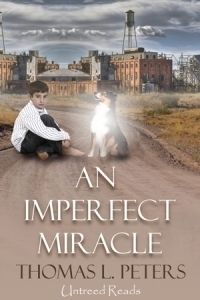 What genre are your books? Do you write in more than one genre?An Imperfect Miracle is a coming-of-age literary adventure for readers of all ages. I also write adult thrillers and action stories and some young adult and middle grade books.
What genre are your books? Do you write in more than one genre?An Imperfect Miracle is a coming-of-age literary adventure for readers of all ages. I also write adult thrillers and action stories and some young adult and middle grade books. If you write in more than one genre, do you use a pen name?I use the name T.L. Peters for my self-pubbed works, and the name Thomas L. Peters for my works released by a publisher. I don't really know why. I just got in the habit of doing it that way.
Did you query agents and traditional publishers? Did you receive an offer of representation or a book contract?I've been under contract by four different literary agents at various times. I am currently unrepresented.
What factors influenced your decision to sign with Untreed Reads?Untreed Reads handles literary fiction, which few e-publishers do. They also routinely work with prominent literary agents, which means that Untreed Reads has credibility in the publishing world.
How involved are you during the creative process for your book's cover design?Not very. I made some suggestions, but they weren't very good. I'm quite happy with the cover that Untreed Reads and the cover artist provided.
Do you plan to self-publish any other books or will you stay with Untreed Reads?I plan to do both. The big advantage of self publishing is that as soon as you're finished with the book, you can release it for sale. With a publisher you have to wait for the editing process, which can take months.
What kinds of social media [twitter, facebook, webpage, blog, writing forums] are you involved with trying to garner attention for your book(s)?I just blog. You can visit me at http://tlpeters.blogspot.com.
How do you feel about the world of digital publishing? Do you think it will replace traditional publishing one day?It may not replace traditional publishing completely, but it will largely replace it. Traditional publishers simply have too many fixed costs to make a go of it in the leaner and more nimble e book world. And e books are clearly the wave of the future.
What is the biggest thing you've learned during your journey as an author?Keep plugging away, and be open to new opportunities.
Do you have any advice for new authors?Don't be afraid to go the self publishing route. And try to handle the cover design and marketing on your own rather than hiring a consultant or book packager. They can be expensive.
What's next for you?I'm halfway through the fourth volume of my new series, The Jake Stone Thrillers.
The first installment of the series, DECEPTION, A Jake Stone Thriller (Book One), is available in e book stores world wide, including through the following online book sellers:
Amazon: http://www.amazon.com/Deception-Stone-Thriller-Thrillers-ebook/dp/B005M2ROW8
Barnes & Noble: http://www.barnesandnoble.com/w/deception-a-jake-stone-thriller-tl-peters/1105552833
Smashwords: http://www.smashwords.com/books/view/87499
 http://store.untreedreads.com/index.php?main_page=product_info&cPath=68_7_47_64&products_id=178
http://store.untreedreads.com/index.php?main_page=product_info&cPath=68_7_47_64&products_id=178
Published on November 28, 2011 05:00
November 25, 2011
Interview with David Perlmutter
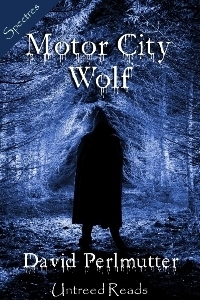 Briefly describe your journey in writing your book.I started writing mostly as a way of entertaining myself and trying to create the characters and worlds I felt needed to exist. As I got older, I kept these ideals in mind and kept doing it, switching to writing short stories and novels from the film scripts I had been working on in order to create a financial means to an end.
Briefly describe your journey in writing your book.I started writing mostly as a way of entertaining myself and trying to create the characters and worlds I felt needed to exist. As I got older, I kept these ideals in mind and kept doing it, switching to writing short stories and novels from the film scripts I had been working on in order to create a financial means to an end. What genre are your books? Do you write in more than one genre?I write speculative fiction (science fiction, fantasy, horror) and an occasional mystery. I try to combine them when and if I can.
If you write in more than one genre, do you use a pen name?No.
Did you query agents and traditional publishers? Did you receive an offer of representation or a book contract?I am concerned that agents will not deal with me if I am not a "name", and likewise traditional publishers, so I haven't tried to approach them yet. I am open to it if they approach me, however.
What factors influenced your decision to sign with Untreed Reads?The financial arrangements it offered, as well as the amount of personal attention given to me by the editor and publisher.
How involved are you during the creative process for your book's cover design?I had no input on it.
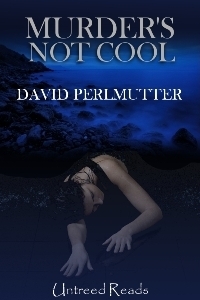 Do you plan to self-publish any other books or will you stay with Untreed Reads?I intend to keep working with Untreed Reads on a regular basis, as well as other publishers with which I work, since loyalty to those who support you is something I value in myself and other people.
Do you plan to self-publish any other books or will you stay with Untreed Reads?I intend to keep working with Untreed Reads on a regular basis, as well as other publishers with which I work, since loyalty to those who support you is something I value in myself and other people.What kinds of social media [twitter, facebook, webpage, blog, writing forums] are you involved with trying to garner attention for your book(s)?I have a Facebook page and used it to promote some of my work. I also participate in the web forums for publishers that have published my work or where I have friends who are involved.
How do you feel about the world of digital publishing? Do you think it will replace traditional publishing one day?I am glad digital publishing has opened up new opportunities for new writers like myself, but my own reading habits are strictly of the print variety. I am hoping that a happy medium can exist between digital and traditional publishing and that they will learn from each other rather than trying to financially undermine each other.
What is the biggest thing you've learned during your journey as an author?That there is a lot more bureaucracy and politics in the writing business than I realized, and that it is not always fair and equal in its dealings.
Do you have any advice for new authors?Be patient if you get rejected and don't blame yourself or others for your "failure". You simply need to find an editor/publisher who likes and respects you and your work and then you can go from there.
What's next for you?My novella "Pups" is currently available from Twisted Library Press, in print form, at Createspace and Amazon.com. I have more e-books coming out soon from Untreed Reads, as well as from Books To Go Now, LLC. I will have a story in the upcoming Wicked East Press anthology "Read The End First" and some other upcoming projects from Static Movement. I also hope to find time to work on a novel project that I have been developing for several years and interest a major publisher in it, if possible.
 David Perlmutter's novels: http://store.untreedreads.com/index.php?main_page=advanced_search_result&search_in_description=1&keyword=david+perlmutter
David Perlmutter's novels: http://store.untreedreads.com/index.php?main_page=advanced_search_result&search_in_description=1&keyword=david+perlmutter
Published on November 25, 2011 05:00
November 24, 2011
Happy Thanksgiving
Just wanted to wish everyone a very Happy Thanksgiving. I hope you get to enjoy the day with family and friends.
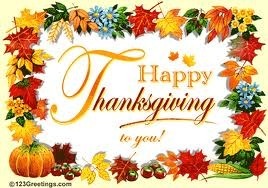
In case you're wondering about the origin of the holiday, here's a recap below:
This is the origin of our annual Thanksgiving Day celebration. Congress of the United States has proclaimed National Days of Thanksgiving to Almighty God many times throughout the following years. On November 1, 1777, by order of Congress, the first National Thanksgiving Proclamation was proclaimed, and signed by Henry Laurens, President of Continental Congress. The third Thursday of December, 1777 was thus officially set aside:
 Then again, on January 1, 1795, our first United States President, George Washington, wrote his famed National Thanksgiving Proclamation, in which he says that it is…
Then again, on January 1, 1795, our first United States President, George Washington, wrote his famed National Thanksgiving Proclamation, in which he says that it is… Many years later, on October 3, 1863, Abraham Lincoln proclaimed, by Act of Congress, an annual National Day of Thanksgiving "on the last Thursday of November, as a day of Thanksgiving and Praise to our beneficent Father who dwelleth in the heavens." In this Thanksgiving proclamation, our 16th President says that it is…
Many years later, on October 3, 1863, Abraham Lincoln proclaimed, by Act of Congress, an annual National Day of Thanksgiving "on the last Thursday of November, as a day of Thanksgiving and Praise to our beneficent Father who dwelleth in the heavens." In this Thanksgiving proclamation, our 16th President says that it is…

In case you're wondering about the origin of the holiday, here's a recap below:
This is the origin of our annual Thanksgiving Day celebration. Congress of the United States has proclaimed National Days of Thanksgiving to Almighty God many times throughout the following years. On November 1, 1777, by order of Congress, the first National Thanksgiving Proclamation was proclaimed, and signed by Henry Laurens, President of Continental Congress. The third Thursday of December, 1777 was thus officially set aside:
"…for solemn thanksgiving and praise. That with one heart and one voice the good people may express the grateful feelings of their hearts, and consecrate themselves to the service of their Divine Benefactor;… and their humble and earnest supplication that it may please God, through the merits of Jesus Christ, mercifully to forgive and blot them (their manifold sins) out of remembrance… That it may please Him… to take schools and seminaries of education, so necessary for cultivating the principles of true liberty, virtue and piety under His nurturing hand, and to prosper the means of religion for the promotion and enlargement of that kingdom which consisteth of 'righteousness, peace and joy in the Holy Ghost'…"
 Then again, on January 1, 1795, our first United States President, George Washington, wrote his famed National Thanksgiving Proclamation, in which he says that it is…
Then again, on January 1, 1795, our first United States President, George Washington, wrote his famed National Thanksgiving Proclamation, in which he says that it is…"…our duty as a people, with devout reverence and affectionate gratitude, to acknowledge our many and great obligations to Almighty God, and to implore Him to continue is… our duty as a people, with devout reverence and affectionate gratitude, to acknowledge our many and great obligations to Almighty God, and to implore Him to continue and confirm the blessings we experienced…"Thursday, the 19th day of February, 1795 was thus set aside by George Washington as a National Day of Thanksgiving.
 Many years later, on October 3, 1863, Abraham Lincoln proclaimed, by Act of Congress, an annual National Day of Thanksgiving "on the last Thursday of November, as a day of Thanksgiving and Praise to our beneficent Father who dwelleth in the heavens." In this Thanksgiving proclamation, our 16th President says that it is…
Many years later, on October 3, 1863, Abraham Lincoln proclaimed, by Act of Congress, an annual National Day of Thanksgiving "on the last Thursday of November, as a day of Thanksgiving and Praise to our beneficent Father who dwelleth in the heavens." In this Thanksgiving proclamation, our 16th President says that it is…"…announced in the Holy Scriptures and proven by all history, that those nations are blessed whose God is the Lord… But we have forgotten God. We have forgotten the gracious hand which preserved us in peace and multiplied and enriched and strengthened us, and we have vainly imagined, by the deceitfulness of our hearts, that all these blessings were produced by some superior wisdom and virtue of our own… It has seemed to me fit and proper that God should be solemnly, reverently and gratefully acknowledged, as with one heart and one voice, by the whole American people…"Source page: http://www.christiananswers.net/q-eden/ednkc002.html
Published on November 24, 2011 05:00
November 23, 2011
Interview with Mike Meyer
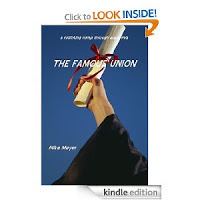 Buy Link: http://www.amazon.com/The-Famous-Union-ebook/dp/B005FZMVB6
Buy Link: http://www.amazon.com/The-Famous-Union-ebook/dp/B005FZMVB6
Can you give us a brief overview of your latest book?I have published two novels on Amazon Kindle. THE SURVIVAL OF MARVIN BAINES is a short novel about real life and whimsy, as they collide head on with a man's midlife crisis. The book is fast paced and filled with colorful characters. Marvin Baines' humorous adventures take him on a journey through which he finally realizes what is really important in life. Funny at times and yet serious too, a winning combination about life, marriage, and coming to terms with one's own quandaries and foibles as midlife suddenly rears its head. THE FAMOUS UNION is a tongue-in-cheek look at the dismal economic situation currently taking place on a small California college campus, where tough financial decisions bring about severe disruption and hilarity to a once very proud institution of higher learning, the home of the Famous Union Fighting Orchids, whose motto is and always has been, "Just wait until next year." It is a rollicking romp through the halls of academia.
Did you try the traditional route to publishing, i.e. querying agents/publishers?My wife recently purchased me a Kindle, and I thought it would be great to get my work our there immediately and see what happens. I am 64 years old. Traditional publishing could take a long time to see my work in print.
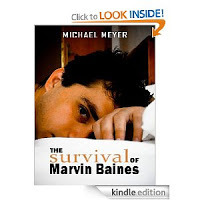 Do you belong to a critique group? Have they helped improve your writing?No, I don't, but I spent 40 years teaching writing on the college level. I am recently retired. I am now able to show rather than to tell.
Do you belong to a critique group? Have they helped improve your writing?No, I don't, but I spent 40 years teaching writing on the college level. I am recently retired. I am now able to show rather than to tell.What factors influenced your decision to self-publish to Amazon?I had read that Kindle sales were quite a bit stronger than those of opposing e-readers.
Did you hire an editor to review your manuscript before publishing?As a retired English professor, I did all my own editing.
What have you've learned during your self-publishing journey?Writing is fun, but marketing is work.
Besides Amazon, are there any other sites where your books are for sale?Presently, my two books are only at Amazon Kindle.
What's next for you?
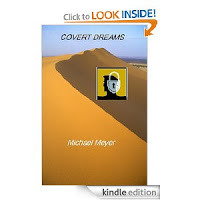 I have just published a thriller set in both Germany and Saudi Arabia, two of the many place in the world where I have lived.
I have just published a thriller set in both Germany and Saudi Arabia, two of the many place in the world where I have lived.Buy link: http://www.amazon.com/COVERT-DREAMS-ebook/dp/B005WO860K
Published on November 23, 2011 05:00
November 22, 2011
World of Symbols: Fairies
The World of Symbols Michelle Snyder: The Symbologistwww.whiteknightstudio.com http://whiteknightstudio.blogspot.com/
The Fairies of Once-Upon-A-Time
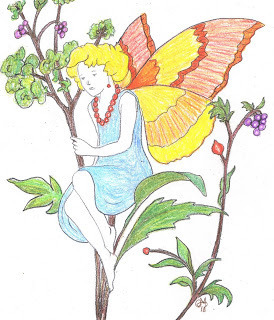 Most of us have grown up surrounded by Fairy tales - stories about good fairies, bad fairies, blue fairies, tooth fairies, fairy godmothers, and some with names, like Tinkerbelle. These elusive little creatures flit in and out of our lives in stories populated with all manner of fascinating creatures. Dwarves, elves, giants, and mischievous little pixies are a few I remember from childhood stories. All these beloved characters have their roots in the same ancient culture, and take part in preserving the records of its history.
Most of us have grown up surrounded by Fairy tales - stories about good fairies, bad fairies, blue fairies, tooth fairies, fairy godmothers, and some with names, like Tinkerbelle. These elusive little creatures flit in and out of our lives in stories populated with all manner of fascinating creatures. Dwarves, elves, giants, and mischievous little pixies are a few I remember from childhood stories. All these beloved characters have their roots in the same ancient culture, and take part in preserving the records of its history. Once upon a time, long, long ago in northern Europe there was a time-of-little-sun. For a thousand years it was mostly overcast, the precious sun peeping through just enough to sustain life. This lack of sun, helped along by human biology, was partly responsible for the emergence of those who became known as Fairies. The sun provides warmth, but also vitamin D, which, among other things, prevents rickets. Dark pigmentation limits the intake of vitamin D, preventing overdoses. The lighter the skin, the more vitamin D is able to be absorbed. The people living in northern Europe during the time-of-little-sun would have produced lighter and lighter skinned offspring; those with darker skin, suffering from rickets, would not have lived long. These fair, almost white-skinned people were descended from the Maglamosians (ca. 7000 BC), and were referred to as the "Fair Folk", and later, "Fairies". They are the subject of stories such as Snow White, Snow Drop, and Rose Red.
The Fair Folk practiced oral tradition just as their ancestors had for thousands of years, and according to the translations by Duncan-Enzmann these records were produced mostly by women. They passed on their history and knowledge in stories accompanied by images. These "bedtime stories" survived suppression and destruction by enemies, and the loss of information over time. We have inherited these records as Fairy tales, compiled and retold by Grimm, Anderson, and numerous other sources.
It is said the Fair Folk dwelled underground, in "fairy mounds", remnants of which can still be seen today. During the time-of-little-sun the weather was cool and damp. Peat grows fast in that environment, and did. It covered the hills, and then it grew over the homes sheltered by the hills. Peat is good insulation and these homes were cozy-warm. Villages looked as if they were underground, as did the people who lived in them. Fairy mounds still dot the landscape in Ireland, evidence of ancient Fairy villages. Why do fairies have wings? Visit my blog for the answer.
The Fair Folk were descendants of the Vanir and Æsir, and were taught astronomy and natural sciences from childhood. Their knowledge of agriculture and navigation positioned them well; they were wise, and socially powerful. Because their knowledge was extraordinary the Fair Folk gained the reputation of having magical powers, and were both feared and loved. Centuries passed and legends of these fair-skinned, underground dwellers with magical powers resonated through history. They were immortalized in stories and legends; powerful Fairy queens and kings holding council on Fairy rings of mushrooms, raising their families in Fairy mounds. We have inherited these wondrous tales of Once Upon A Time, and, if we know how to see it, the history of a civilization that lasted thousands of years and still has descendants today. Article and artwork © 2011 Michelle Snyder, author of Symbology: Decoding Classic Images , available at Amazon and Barnes & Noble online, and at The Book Rack Bookstore in Arlington. Read more, and post your questions or comments on her blog: www.whiteknightstudio.com.
Published on November 22, 2011 05:00



